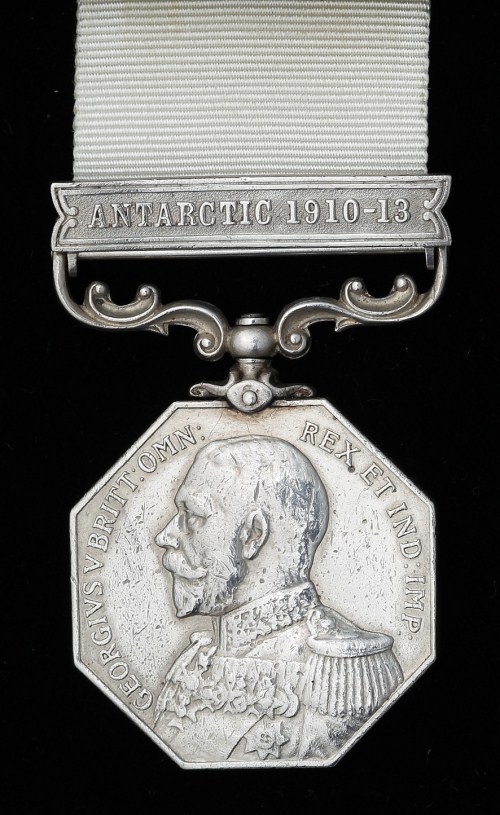
Auction: 11007 - Orders, Decorations, Campaign Medals & Militaria
Lot: 178
The Important Polar Medal to Chief Petty Officer F.V. Browning, Royal Navy, A Member of the ´Northern Party´ During Scott´s Last Antarctic Expedition, 1910-13 Polar Medal 1904, G.V.R., 1st type, silver, one clasp, Antarctic 1910-13 (206545 F.V. Browning, P.O. 2Cl. Terra Nova), contact marks, nearly very fine Estimate £ 4,000-6,000 Frank Vernon Browning born Stockland, Devon, 1882; joined Royal Navy as Boy 2nd Class, June 1900; advanced Petty Officer 2nd Class, November 1905; whilst serving in H.M.S. Talbot he was recruited for service in the Terra Nova as part of Scott´s ill-fated Antarctic Expedition 1910-13; was present during the Terra Nova´s stormy passage south, before serving in the "Northern Party" - a six-man team under Commander Victor Campbell, R.N., January 1911-January 1913; Campbell´s party arrived at Cape Adare, 18.2.1911, established a base and settled down for the winter; between July-October short journeys of exploration were made and extensive scientific observations taken; between 4th-20th October an exhaustive return journey across the bay over the pack ice was carried out; on the 6th January 1912 Campbell and his team were embarked in the Terra Nova to Evans Cove to carry out a six week expedition; two days later the Terra Nova sailed away with an agreed return date for collection of the 18th February; Campbell took six weeks´ rations for the party, with the intention of sledging across Wood Bay; the party were unable to carry out the proposed journey but did however carry out considerable surveying before returning to a depot they had established at Evans Cove, to await the arrival of the Terra Nova; however, the ice was against them, and the Terra Nova was unable to come and pick them up thus leaving the men stranded, with the prospect of surviving the imminent Polar winter with scant rations and the wrong survival equipment; nine months of extreme hardship and privation ensued during which both courage and great endurance were shown by the 6 men; equipped with summer clothing, light tents and no hut they constructed an igloo and only left the limited warmth of it to hunt for seals or penguins; the men´s adaptability and ingenuity undoubtedly saved their lives against some of the harshest climatic conditions on the planet - due to the regular collapse of the entrance to the igloo, and as such the constant threat of asphyxiation, Browning and Petty Officer G.P. Abbott managed to design and construct a secure entrance made out of ski-sticks and ice blocks; to counter-act the prospect of long months in darkness, Browning and Seaman Dickason constructed a lamp made out of a strand of rope suspended from a "bridge" across the top of an Oxo-tin filled with melted blubber; with the arrival of more temperate weather in August, the weakened men set off on their sledges for Cape Evans, 30.9.1912; enroute they fortunately stumbled across the contents of an old depot left by Shackleton´s 1907-09 expedition; they arrived at Cape Roberts four weeks later, returning to Hut Point on the 6th November, here only to learn of the tragic fate of Scott and his party; Browning returned to the Royal Navy as Petty Officer 1st Class, and was serving in the cruiser Carnarvon at the outbreak of the Great War; served in the latter at the Battle of the Falklands, 8.12.1914, when she supported the Inflexible and the Invincible in their action against the Scharnhorst and the Gneisenau; advanced Chief Petty Officer and served with Carnarvon until November 1917; subsequent service included at H.M.S. Defiant (Torpedo Establishment) and in the Titania (submarine depot ship); served in H.M.S. Warspite from January 1920, off Ireland during the Sinn Fein troubles; retired June 1922. Browning´s diary of the expedition is in the Scott Polar Research Institute, Cambridge, and his diary for 1912 is in a New Zealand Museum.
Sold for
£11,000




